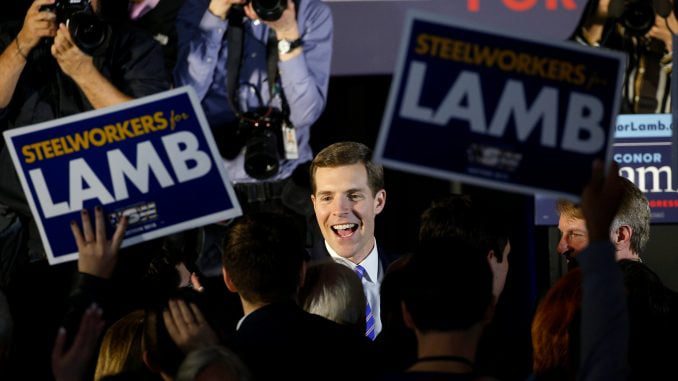
CANONSBURG, Pa., – The Democrat candidate claimed a congressional election victory in a Republican heartland in Pennsylvania, even while remained officially too close to call early on Wednesday.
Eight months before national midterm elections, official results with all ballots from voting booths counted showed moderate Democrat Conor Lamb leading conservative Republican Rick Saccone by a fraction of a percentage point.
Trump won the Pennsylvania 18th Congressional District that they are contesting by almost 20 points in the 2016 presidential election.
With TV networks, which often call U.S. elections, yet to predict a winner, officials were continuing to count several hundred absentee ballots to try to determine the result.
Democratic sources said that, once those ballots were included, they expected Lamb to have won the election by more than 400 votes.
“It took a little longer than we thought but we did it. You did it,” Lamb, a U.S. Marines veteran, told cheering supporters late on Tuesday.
Speaking before Lamb claimed victory, Saccone – who has described himself as “Trump before Trump was Trump” – said the contest was not yet over.
“We’re going to fight all the way to the end. You know I never give up,” the 60-year-old state told supporters.
MODERATE DEMOCRAT
The strong showing by Lamb, 33, seems certain to buoy Democrats nationally as they seek to win control of the U.S. House of Representatives from Republicans in the November elections.
Republican dominance had been so strong in the district, a patchwork of small towns, farms and Pittsburgh suburbs, that Democrats ran no candidates in the previous two U.S. House elections here. Lamb’s image as a moderate seemed to have worked in his favor.
Saccone led the race by more than 10 percentage points in January.
But Lamb, a pro-gun, pro-life Democrat with strong backing from unions, surged in polls as Democratic voters sensed a chance to show their opposition to Trump.
Saccone, a former Air Force counter-intelligence officer, drew criticism toward the end of the campaign by saying that some of his opponents “have a hatred for God.”
The White House arranged a string of visits to energize Saccone supporters. Trump himself held a campaign rally for Saccone last weekend and on Tuesday he again voiced his backing.
MOMENTUM BOOST
The contest, to replace a Republican who resigned amid a scandal last year, was the latest good election showing for the Democrats, who also won a governor’s race in Virginia and scored a U.S. Senate upset in conservative Alabama.
The Pennsylvania result will have little bearing on the current balance of power in the House, but Democrats hope a win will boost their momentum as they try to pick up the 24 seats they need to gain control in November.
Of the 85 races currently viewed as competitive, 55 are in congressional districts that Trump won in 2016, according to the University of Virginia Center for Politics.
Saccone’s poor performance is worrying for Republicans who were sure that tax cuts, the party’s only major legislative achievement under Trump, would be a vote winner this year.
But that sweeping overhaul did little to energize local voters, some of whom dismissed it as a giveaway to the wealthy.
Republicans found it harder than expected to mount effective attacks on Lamb’s positions on abortion, guns and the national Democratic Party.
He has also eschewed the national Democrat brand, saying he would not support House Democratic leader Nancy Pelosi as speaker.
Lamb says he personally opposes abortion but accepts the Supreme Court’s landmark 1973 Roe vs. Wade decision allowing abortion as the law of the land.
Lamb, who hails from a prominent Pennsylvania political family, rarely mentions Trump, focusing on economic issues, healthcare and protecting Social Security and Medicare.



